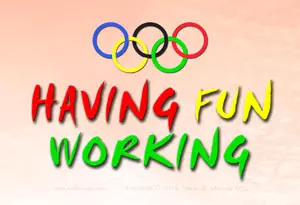Having Fun Working, the Big Olympic Tip
Many executives see fun as unprofessional. Thus, when employees are having fun working, they aren’t working. Yet, the 2016 Olympics show the importance new advanced training puts on fun.

Having fun working sounds fun. That means it sounds easy. It’s not.
Enjoy the Moment
Watch again any interview with Olympic athletes this year. When asked about their approach, they often talk about enjoying the moment. That means having fun. That means enjoying what they do.
How many employees are having fun working? How many would do that work even if they didn’t get paid?
For example, I met a man who enjoyed repairing machines at work. When I asked, “Why?” he said he liked to work on his cars. He’s good at it. It’s fun.
Going Beyond Just Enjoying the Work
Even if employees can’t enjoy the work, they can still have fun working. What Olympic training has learned is that enjoying the sport is not enough. Burnout can destroy that enjoyment. Injuries can too. The most common injuries are overuse ones.
Therefore, Aimee Boorman, the long-time coach of Simone Biles, the gold-medal gymnast, took a low-key approach throughout Biles’ career. This meant:
- Maintaining Biles’ key relationships
- Keeping it fun by not pushing her to be great
- Living as a normal human day to day
- Pacing the teaching of new skills
In the past, Olympic hopefuls gave up friends, child-hood coaches and even family to pursue their dreams. Long, relentless and intense training that pushed them dominated. Living as a normal child or teen did not exist.
Having Fun Working Means Working Smarter Too
Having fun working sounds fun. That makes it sound easy too. It’s not. It’s a problem. So, to have fun working also means working smarter. It’s fun to solve things.
For example, the training of U.S. Olympic swimmers saw:
- Reducing the amount of training
- Increasing its intensity
- Focusing more on skills and techniques
Technology has helped here. Underwater video and computer models has helped the sport understand better how a body bests move through water. For instance, it now knows that technique counts for 90% of performance, strength and endurance only 10%.
Having Fun in Other Types of Work
At first it’s hard to compare most of our daily work to that of Olympians. Dig deeper though, and it’s not. For instance, what do most employees like about their work? The people. Read relationships.
We can translate the above Olympic points in the same way:
- Avoid pushing people too hard thus creating burnout and absenteeism
- Treat people as humans not cogs
- Take advantage of “teachable moments” to pace the intro of new things
- Encourage breaks and time off
- Allow people to work intensely without interruptions (i.e. meetings)
- Personalize skill development and avoid one-size-fits-all group training
Still, I’m sure it’s hard for some to see their employees as Olympians. Even the employees might have a hard time seeing themselves as that. Of course that doesn’t mean being treated like an Olympian wouldn’t be fun.


